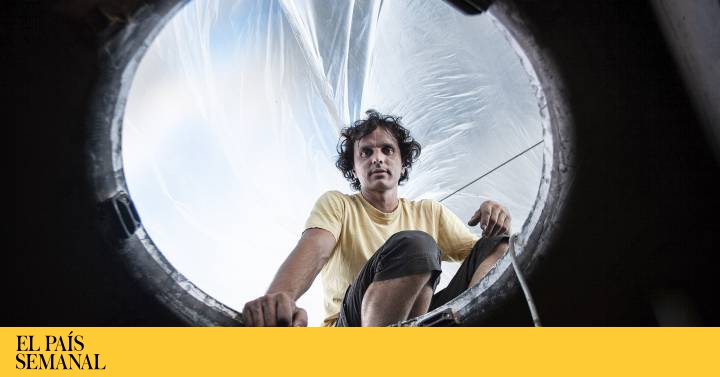A firefighter by profession, he is one of the most experienced transoceanic sailors of his generation.
Didac Costa (Barcelona, 39 years old) faces his second round of the Vendée Globe, the most demanding solo ocean sailing competition, without stopovers or assistance, which will drop moorings at Les Sables d'Olonne (France) on 8 November.
After the confinement imposed by the pandemic, Costa will once again confine itself, this time voluntarily, in about 12 square meters, the living space of the
One Planet
cabin
, One Ocean,
a monohull of 18.28 meters in length and 5, 30 manga.
There it will spend, in a constant movement, about 100 days, the time it will take to travel the 24,840 nautical miles (46,004 kilometers) of a route with departure and arrival to that small town on the French Atlantic coast, where it will return after sailing around the world from west to east leaving the three capes (Buena Esperanza, Leeuwin and Hornos) on the port side.
On his journey, he will follow a pattern of rest known as extreme polyphasic sleep: periods of a maximum of 20 minutes or half an hour asleep after which he must wake up to check that everything is going well.
If so, you are back to sleep in seconds, chaining up a maximum of four or five sleep periods.
It is documented that Leonardo Da Vinci rested for seasons in a similar way to stimulate his creativity.
Those who know the Spanish sailor say of him that he shows, above all, determination, determination and courage.
With an almost obsessive way of working, tenacity, perseverance and, ultimately, never giving up and fighting to the end are his identity and the key to the success of his projects.
Didac Costa inspects the stern of the sailboat.
JORDI ADRIÀ
A fan of mountains, mountaineering and skiing, he was a member of the first group of young people selected by the Center for Modernization of Mountain Skiing of Catalonia (CTEMC) to be part of the Catalan team.
He participated in numerous competitions and achieved several podiums in the junior Spanish championships.
Jordi Canals, its first director, recalls how that 16-year-old young man caught his attention when he first entered the center with the classic blue wool cap that sailors often wear.
During the four years he was there, he discovered what would later become his profession.
A lot had to do with it, one of its instructors and technical director, Alfons Valls, then a member of the special fire rescue groups, who instilled the vocation in at least 4 of the 17 students in the class, including the young man Coast.
He started sailing when in summer he visited the Balearic Islands, Sardinia or Greece on his father's boat.
After some time sailing in dinghy, he moved to the Mini 650 class, in which he competed in several regattas in the Mediterranean before participating in the crossing of the Atlantic in the Mini Transat in 2011, between La Rochelle (France) and Bahia (Brazil ), in which he finished 19th.
"That experience encouraged me to go further: to sail in the fastest boats, the Imoca 60s," says the skipper.
On board one of them he completed his first round-the-world regatta, the Barcelona World Race (BWR).
In December 2014, he became the youngest sailor to start the competition for two, joining with Aleix Gelabert the crew of
One Planet, One Ocean & Pharmaton,
the former
Kingfisher.
During the test, his partner suffered a health problem and he had to perform many tasks alone.
They were very hard moments.
After crossing the finish line in fourth position in April 2015, he expressed two wishes: have a horchata and one day be able to be at the start of the Vendée Globe.
He had his first contact with the emblematic French regatta when he was a child through the stories his parents told him, who followed José Luis de Ugarte, the navigator from Getxo (Bizkaia) who died in 2008 who was the first Spaniard to complete the race. regatta in 1993. "I was little and, reading the book he wrote
[The Last Challenge],
I thought that one day I could do it too."
Four years ago, he competed for the first time in the event.
It was a story of overcoming from the moment he decided, a round the world always on the brink of shipwreck in which he faced his greatest sporting and personal challenge without a main sponsor to finance the project.
He even had to invest the savings - he mortgaged his house - to fulfill his dream.
And, although it was not a winning plan, he achieved, together with a team of four friends (Jordi Griso, Aleix Gelabert, Aitor Ocerin and Trabal Peña), his main objective, to finish the test.
On February 23, 2017, after 108 days of sailing,
One Planet, One Ocean
crossed the finish line in 14th position.
Costa became the second Spaniard to complete the tour.
Upon arrival, as is customary, the organization asked him what he would like to eat upon disembarking: “I asked for Galician octopus, but I was left with the desire;
They couldn't get a plate, ”he recalls.
Maneuver to throw the boat into the water.
JORDI ADRIÀ
In two weeks, Costa will face his second assault on Everest of ocean sailing: already before setting sail, almost half of the skippers know that due to their toughness they will not be able to finish the test.
The competition, which has been held every four years since 1989, will break the participation record in this ninth edition, as the quota has been increased from 30 boats to 33. Costa, the only Spanish in the regatta, is part of the group of non-professional sailors who They do not aspire to win, but to complete the regatta.
The skipper will sail with the most emblematic boat in the fleet, the old
Kingfisher,
at whose helm the British Ellen MacArthur finished second in the 2000 Vendée. “I have the advantage of knowing the boat very well, with which I have given two around the world, ”says Costa.
However, there is the downside of the many miles the ship accumulates: this will be its sixth circumnavigation.
In recent months, the shore team, many of them volunteers, have renovated and modernized the boat to increase its safety, something essential in an extreme endurance test for the navigator and for the materials.
These works allowed the weight of the sailboat to be lowered by about 500 kilos, which at the beginning of August was put in the water for the training program and to sail the 2,000 nautical miles (3,704 kilometers) that Costa had to certify to ensure its presence on the line of departure.
Since then, the countdown to check and adjust all the systems that the boat needs to face such a demanding regatta has started.
The new adventure of Didac Costa will be a reality based on perseverance.
And, although the future is uncertain, his priority is to be able to continue browsing professionally.
With an inexhaustible illusion, the idea that this Vendée Globe serves as a starting point, especially after the investment that the team has made with the purchase of the boat - acquired from the Foundation for Ocean Navigation of Barcelona (FNOB) -, is a guarantee of the seriousness and determination of the project.









